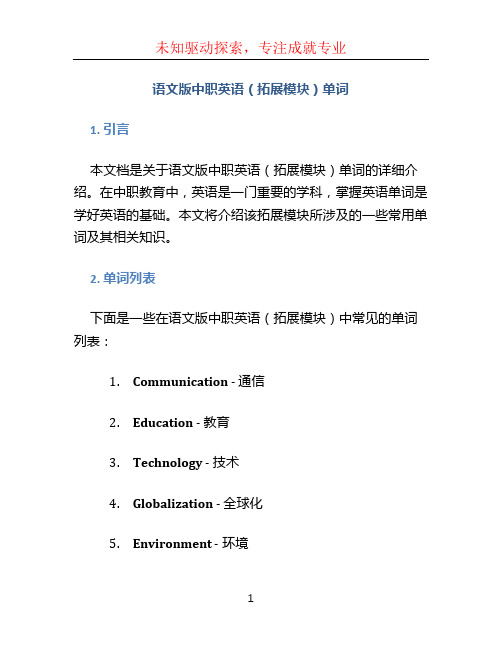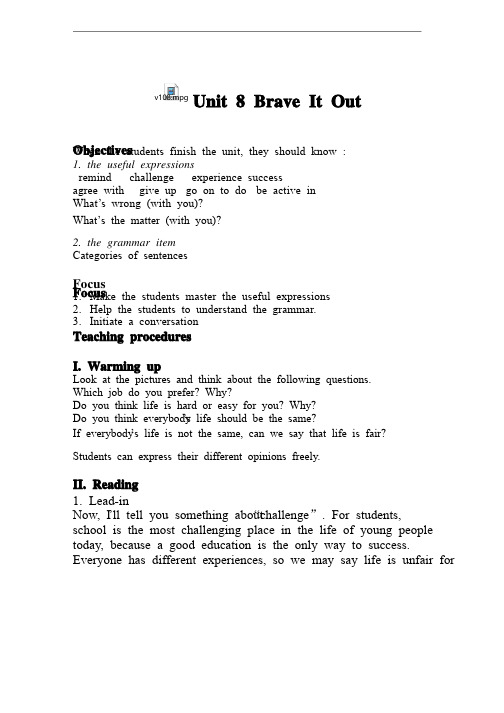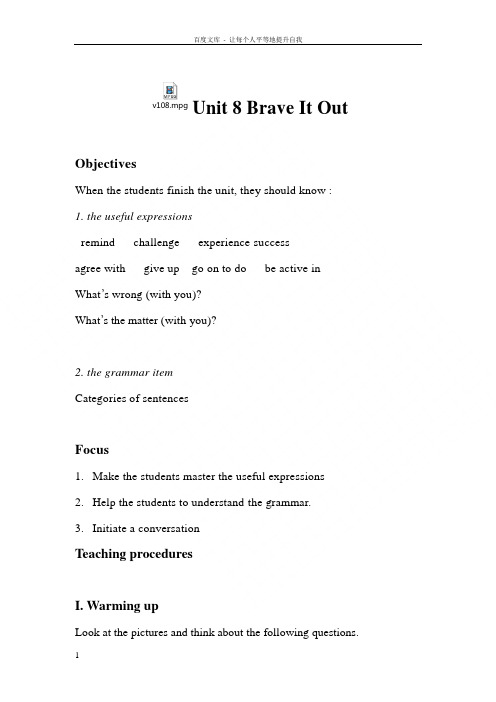语文版中职英语(拓展模块)Unit 8《General Science》ppt课件1
语文版中职英语(拓展模块)单词

语文版中职英语(拓展模块)单词1. 引言本文档是关于语文版中职英语(拓展模块)单词的详细介绍。
在中职教育中,英语是一门重要的学科,掌握英语单词是学好英语的基础。
本文将介绍该拓展模块所涉及的一些常用单词及其相关知识。
2. 单词列表下面是一些在语文版中职英语(拓展模块)中常见的单词列表:munication - 通信cation - 教育3.Technology - 技术4.Globalization - 全球化5.Environment - 环境6.Sustainable - 可持续的7.Innovation - 创新8.Entrepreneurship - 创业精神9.Collaboration - 合作10.Leadership - 领导力3. 单词解释3.1 CommunicationCommunication是指通过语言、文字、符号等方式传递信息或观点的过程。
在现代社会中,良好的沟通能力是非常重要的,它能够帮助我们与人相互交流和理解。
3.2 EducationEducation是指人们受到的系统的知识和技能的培养过程。
受到良好的教育对个人发展和社会进步都起着重要的作用。
3.3 TechnologyTechnology指的是应用科学和工程知识,通过设计、制造和使用工具、机器、设备等,以解决人类生活中的问题的方法和技术。
3.4 GlobalizationGlobalization是指世界范围内经济、文化、政治等领域的相互联系和依赖的现象。
随着科技的发展和国际贸易的增加,各国之间的联系日益紧密,全球化成为一个重要的话题。
3.5 EnvironmentEnvironment指的是人类生活的周围自然和社会条件的总和。
保护环境已经成为全世界共同关注的重要问题,人们要积极采取措施保护地球。
3.6 SustainableSustainable意味着能够持续地发展或存在的。
可持续发展是指在满足现有需求的同时,不危及子孙后代满足其需求的能力。
中职英语语文出版社基础模块下unit8

课文学习
• One day an idea came to his mind. Why not make his tea into an iced drink?
• 有一天,他突然想到了一个主意,为什么不把他的热茶变成冷饮 呢?
• make sth.\sb. into...将某物、某人变成...
26
课文学习
• For seven months in 1904, the city of St. Louis became the’’World’s University.” The Fair offered people an opportunity to learn first-hand information about the wonders and the cultures far from their everyday lives.
• 如果我们处理坏运气时聪明一点,情况可能会变好。下面的故事 就能给我们一些启示。
24
课文学习
• In 1904, the World’s Fair was held in St. Louis, Missouri, USA. • 1904年,世界博览会在美国密苏里州圣路易斯举行。
• hold-held-hled 抓着,举着;举办(主语是人) • Joy will hold a party on Sunday. Joy将要在周日举办一场聚会。 • A party will be held by Joy on Sunday. • 一场聚会将要在周日由Joy举办。
34
课文学习
• Then, he put a lot of ice into the brewed tea, mixed it with sugar and gave it away for free.
语文版中职英语(基础模块上册)Unit8《BraveItOut》word教案

v108.mpg Unit 8 Brave It OutObjectivesWhen the students finish the unit, they should know : 1. the useful expressionsremind challenge experience success agree with give up go on to do be active in What’’s wrong (with you)? WhatWhat’’s the matter (with you)? What2. the grammar itemCategories of sentencesFocus1.Make the students master the useful expressions 2.Help the students to understand the grammar. 3.Initiate a conversationTeaching proceduresI. Warming upLook at the pictures and think about the following questions. Which job do you prefer? Why? Do you think life is hard or easy for you? Why? Do you think everybody’s life should be the same? If everybody’s life is not the same, can we say that life is fair? Students can express their different opinions freely. II. Reading1. Lead-in “challenge”. For students, Now, I’ll tell you something about school is the most challenging place in the life of young people today, because a good education is the only way to success. Everyone has different experiences, so we may say life is unfair for each one. Patrick is an American-born Chinese. When he was young he was hurt in a diving challenges to finish his school courses. Finally he became a good English teacher. Life is unfair for Patrick, but he has been successful. Please read the text as fast as possible and fill in the blanks with proper words and phrases orally in the practice exercises after reading the text. Ask the students to skim the reading material and answer the questions. l Have you heard of the story of Patrick and what do you think of him? l What will you do if you fail many times some day ?2. Make the students read the material carefully, try to understand the main idea of the text. Five minutes later, ask students to complete the blanks on page63. Tell the students to look through the passage again and check the answers. III. Language studyA . A. Deal with some difficult language points (1) Do you agree with the idea that life is fair? agree with sth. E.g. : I agree with your answer. (2) It reminded me of something a teacher said when I was a high school student. remind sb. of sth. The picture reminded me of the days we worked on the farm. (3) But he never gave up and went on to finish school. give up go on to do sth. e.g. : She has given up the idea. After he finished writing the letter, he went on to read the text. (4)Now he is very active in teaching English and helping children who are out of school. be active in doing sth. He is active in helping classmates who have difficulty in learning. ’t a failure until he (5)A man can fail many times, but he isnbegins to blame somebody else. not…until…’clock. He didn’t go to bed until 10 oB. GrammarCategories of sentences 1. Declarative sentences I go to school by bike every. She does n’n’t like playing basketball. t like playing basketball. Tom can speak English. 2. Interrogative sentences 1) General questions ----Does she like music? ----Yes, she does ----Is there a map on the wall? ----No, there isn’t. ----Did you to school yesterday? ----Yes, I did. 2) Special questions question word: who, whom, whose, what, which, when, what time, where, why, how, how many, how much ----Who is the man over there? ----He is our English teacher. ----Why are you late for school today? ----I miss the early bus. ----Whose coat is this? ----It ----It’’s Tom ’s. 3) Alternative questions ----Is this a basketball or a football? ----It ----It’’s a basketball. ----which is your bag, the blue one or the yellow one? ----The blue one. 4) Disjunctive questions ----You are from Australia, aren ’t you? ----No, I ’m not. I ’m from Canada. ----She didn ’t visit her aunt yesterday, did she? ----Yes, she did. 3. Imperative sentences Sit down, please. Close the door, please. Don ’t put the flowers on the table, please. Never do it again. 4. Exclamatory sentences 1) How + adj. /adv. + subject + verb! How nice the flowers are! How fast Tom is riding on his bike! 2) What + a (an) + adj. + noun(single) + subject + verb! What a big apple it is! What an interesting book it is! 3) What + adj. + noun(pl.) or uncountable noun + subject + verb! What good students they are! What bad news it is! IV. Comprehensive Language Skills A. ListeningListen to the dialogues between Mary and Jack and fill in the missing words to complete each of the dialogues according to what you have heard. Then answer the questions orally. The question of the first dialogue: Why is Jack late? (The key :Because he got up late this morning.) The questions of the second dialogue: 1) Who is making the noise? What ’s Jack doing? (The key: Jack. He is fixing the door.) 2) Does Mary care much about noise? (The key: No, she doesn ’t.) Play the tape again and fill in the blanks then check the answer. If needed, play the tape the third time. B. Reading & Speaking This dialogue is about expressing concern. Read the dialogue with your partner. Understand the dialogue between Mary and Jack. Invite some of them to act it out Show more useful expressions: What What’’s wrong (with you)? What What’’s the matter (with you)? Anything wrong? What What’’s the problem? What happened? You look terrible. Are you ill? You don ’t look well. You look down. I lost m y …I failed … I don ’t feel … Really ?I ’m sorry to hear that. Oh, dear! I ’m sorry to hear that. Is that so? I ’m sorry to hear that. Take it easy. Don Don’’t worry. It It’’s not a big problem. Take the dialogue between Mary and Jack as an example to have a talk with your partner in the following situations. The useful expressions may help you. 1.You have lost your money. 2.Your computer is down. Act it out in the class. C. WritingIn this part ,help the students write a text message on the mobile phone. The text message on the mobile is brief and simple. 1. You new telephone number. 2. Ask when to go and see your teacher. (Example: Dear Mary, when shall we go and see our teacher? Please tell me, my new phone number is 3456789.) V. Sum- upFrom this unit, you have learned: useful verbs: useful nouns”useful expressions: a new grammar item: AssignmentWrite down what you have learned from “Brave it out”Role-play activityExpressing Concern Step1 Warming up the dialogue on page 66. Step2 Explaining the situation of the task, then work in pairs to act it out with their partner. Step3 Helping the students deal with necessary expressions about the topic. Step4 Carrying on group work to prepare the following situations: 1. You have lost your money. 2. Your computer is down. Step5 Inviting two or three pairs to act them out. 。
中职英语拓展模块unit8课后题答案

中职英语拓展模块unit8课后题答案1、Have you done something _______ on the weekends? [单选题] *A. special(正确答案)B. soreC. convenientD. slim2、The Yangtze River is one of ()the in the world. [单选题] *A. longest riverB. longest rivers(正确答案)C. longer riverD. longer rivers3、The huntsman caught only a()of the deer before it ran into the woods. [单选题] *A. gazeB. glareC. glimpse(正确答案)D. stare4、19._______ will the film Country Road last? [单选题] *A.How farB.How oftenC.How soonD.How long(正确答案)5、John had planned to leave but he decided to stay in the hotel for _____ two days because of the heavy rain. [单选题] *A. otherB. another(正确答案)C. the otherD. others6、They will hold the party if they _____ the project on time. [单选题] *A. will completeB. complete(正确答案)C.completedD. had completed7、Can I _______ your order now? [单选题] *A. makeB. likeC. giveD. take(正确答案)8、4.—Let's fly a kite when you are ________ at the weekend.—Good idea. [单选题] * A.warmB.kindC.smallD.free(正确答案)9、Bliss, who worked in an information centre, began to work on the book in 1 [单选题] *A. 策划B. 上班C. 写作(正确答案)D. 销售10、--Jimmy, you are supposed to?_______ your toys now.--Yes, mom. [单选题] *A. put upB. put onC. put away(正确答案)D. put down11、Your father is very busy, so he ______ play football with you this afternoon.()[单选题] *A. doesn’tB. don’tC. isn’tD. won’t(正确答案)12、( ) _____ New York _____ London have traffic problems. [单选题] *A. All…andB. Neither….norC. Both…and(正确答案)D. Either…or13、A lot of students in our school were born _______ March, 1 [单选题] *A. in(正确答案)B. atC. onD. since14、Lucy _______ at 7:00 every day. [单选题] *A. go to schoolB. goes to school(正确答案)C. to go to schoolD. went?to?school15、We need a _______ when we travel around a new place. [单选题] *A. guide(正确答案)B. touristC. painterD. teacher16、She often _______ at 21: [单选题] *A. go to bedB. gets upC. goes to bed(正确答案)D. gets to17、It’s very hot. Please _______ your coat. [单选题] *A. look afterB. take off(正确答案)C. take onD. put on18、10.Mum, let me help you with your housework, so you ________ do it yourself. [单选题] * A.don’t need to(正确答案)B.need toC.don’t needD.need19、A modern city has sprung up in _____was a waste land ten years ago. [单选题] *A.whichB.what(正确答案)C.thatD.where20、The news is?_______. We are all _______ at it. [单选题] *A. exciting;?excited(正确答案)B. excited;?excitingC. exciting;?excitingD. excited;?excited21、Stephanie _______ going shopping to staying at home. [单选题] *A. prefers(正确答案)B. likesC. preferD. instead22、_______ your help, I passed the English exam. [单选题] *A. ThanksB. Thanks to(正确答案)C. Thank youD. Thank to23、87.—Could you? ? ? ? ? ? me the way to the nearest hospital?—Sure. [单选题] * A.askB.tell(正确答案)C.talkD.speak24、77.You can watch TV when you finish________ your homework. [单选题] *B.doC.to doingD.doing(正确答案)25、They may not be very exciting, but you can expect ______ a lot from them.()[单选题] *A. to learn(正确答案)B. learnC. learningD. learned26、I used to take ____ long way to take the bus that went by ____ tunnel under the water. [单选题] *A. a, aB. a. theC. a, /(正确答案)D. the, a27、The black coal there shows a sharp()white snow. [单选题] *A. contract withB. content withD. contrast to(正确答案)28、( )He gave us____ on how to keep fit. [单选题] *A. some advicesB. some advice(正确答案)C. an adviceD. a advice29、In order to find the missing child, villagers _______ all they can over the past five hours. [单选题] *A. didB. doC. had doneD. have been doing(正确答案)30、24.I often ask my English teacher some questions ________ e-mail. [单选题] *A.by(正确答案)B.inC.forD.with。
中职英语拓展模块Uint_8《Information_Age》

for home use only, a smaller screen will do.
W: I am studying on IT so I want to do some homework on it. _____________________
M: If you are into designing, you will want to look into what video card is installed in your laptop.
B. Advertisement of iPhone E. User’s Guide
C. Learn to Use Your Computer
1 __________B_____________
iPhone could do all sorts of things like making phone calls, surfing the Net, playing music and taking pictures. But the Apple Company has showed us the functions of it are endless. Here’s our list of eight cool things your iPhone can do for you.
最新语文版中职英语(基础模块-下册)Unit-8《The-Business-World》ppt课件1

Unit 8 The Busi源自ess WorldLanguage Study 教材71页
1. popular 2. take a turn for the better 3. Be interested in 4. either, or 5. offered 6. deal with 7. whether, or 8. gave away
语文版中职英语(基础模块-下 册)Unit-8《The-Business-
World》ppt课件1
Unit 8 The Business World
Reading Comprehension 教材70页
1. The World’s Fair 2. for seven months 3. the wonders and the cultures far from their everyday lives. 4. expand; sell his tea 5. very hot 6. a lot of ice; free 7. hit 8. positively; better
哈现代服务职业学校
Unit 8 The Business World
练习册62页
III. Comprehensive Exercises 4. 1) Learning
7) reading
2) Writing
8) going
3) smoking
9)drinking
4) arguing
10) laughing
哈现代服务职业学校
练习册61页
III. Comprehensive Exercises 2.
Unit 8 The Business World
语文版中职英语基础模块上册Unit8BraveItOut

v108.mpg Unit 8 Brave It OutObjectivesWhen the students finish the unit, they should know :1. the useful expressionsremind challenge experience successagree with give up go on to do be active in What’s wrong (with you)?What’s the matter (with you)?2. the grammar itemCategories of sentencesFocus1.Make the students master the useful expressions2.Help the students to understand the grammar.3.Initiate a conversationTeaching proceduresI. Warming upLook at the pictures and think about the following questions.Which job do you prefer? Why?Do you think life is hard or easy for you? Why?Do you think everybody’s life should be the same?If everybody’s life is not the same, can we say that life is fair?Students can express their different opinions freely.II. Reading1. Lead-inNow, I’ll tell you something about “challenge”. For students, school is the most challenging place in the life of young people today, because a good education is the only way to success. Everyone has different experiences, so we may say life is unfair for each one. Patrick is an American-born Chinese. When he was young he was hurt in a diving challenges to finish his school courses. Finally he became a good English teacher. Life is unfair for Patrick, but he has been successful.Please read the text as fast as possible and fill in the blanks with proper words and phrases orally in the practice exercises after reading the text.Ask the students to skim the reading material and answer thequestions.●Have you heard of the story of Patrick and what do you thinkof him?●What will you do if you fail many times some day?2. Make the students read the material carefully, try to understand the main idea of the text.Five minutes later, ask students to complete the blanks on page63.Tell the students to look through the passage again and check the answers.III. Language studyA. Deal with some difficult language points(1)Do you agree with the idea that life is fair?agree with sth.. : I agree with your answer.(2)It reminded me of something a teacher said when I was ahigh school student.remind sb. of sth.The picture reminded me of the days we worked on the farm.(3)But he never gave up and went on to finish school.give upgo on to do sth.. : She has given up the idea.After he finished writing the letter, he went on to read the text.(4)Now he is very active in teaching English and helpingchildren who are out of school.be active in doing sth.He is active in helping classmates who have difficulty in learning.(5) A man can fail many times, but he isn’t a failure until hebegins to blame somebody else.not…until…He didn’t go to bed until 10 o’clock.B. GrammarCategories of sentences1. Declarative sentencesI go to school by bike every.She does n’t like playing basketball.Tom can speak English.2. Interrogative sentences1) General questions----Does she like music?----Yes, she does----Is there a map on the wall?----No, there isn’t.----Did you to school yesterday?----Yes, I did.2) Special questionsquestion word:who, whom, whose, what, which, when, what time, where, why, how, how many, how much----Who is the man over there?----He is our English teacher.----Why are you late for school today?----I miss the early bus.----Whose coat is this?----It’s Tom’s.3) Alternative questions----Is this a basketball or a football?----It’s a basketball.----which is your bag, the blue one or the yellow one? ----The blue one.4) Disjunctive questions----You are from Australia, aren’t you?----No, I’m not. I’m from Canada.----She didn’t visit her aunt yesterday, did she?----Yes, she did.3. Imperative sentencesSit down, please.Close the door, please.Don’t put the flowers on the table, please.Never do it again.4. Exclamatory sentences1) How + adj. /adv. + subject + verb!How nice the flowers are!How fast Tom is riding on his bike!2) What + a (an) + adj. + noun(single) + subject + verb!What a big apple it is!What an interesting book it is!3) What + adj. + noun(pl.) or uncountable noun + subject +verb!What good students they are!What bad news it is!IV. Comprehensive Language SkillsA. ListeningListen to the dialogues between Mary and Jack and fill in the missing words to complete each of the dialogues according to what you have heard. Then answer the questions orally.The question of the first dialogue:Why is Jack late?(The key:Because he got up late this morning.)The questions of the second dialogue:1) Who is making the noise? What’s Jack doing?(The key: Jack. He is fixing the door.)2) Does Mary care much about noise?(The key: No, she doesn’t.)Play the tape again and fill in the blanks then check the answer. If needed, play the tape the third time.B. Reading & SpeakingThis dialogue is about expressing concern.Read the dialogue with your partner. Understand the dialogue between Mary and Jack.Invite some of them to act it outShow more useful expressions:What’s wrong (with you)? What’s the matter (with you)? Anything wrong?What’s the problem?What happened? You look terrible. Are you ill?You don’t look well. You look down.I lost m y…I failed…I don’t feel…Really?I’m sorry to hear that. Oh, dear! I’m sorry to hear that. Is that so? I’m sorry to hear that. Take it easy.Don’t worry.It’s not a big problem.Take the dialogue between Mary and Jack as an example to have a talk with your partner in the following situations. The usefulexpressions may help you.have lost your money.computer is down.Act it out in the class.C. WritingIn this part ,help the students write a text message on the mobile phone.The text message on the mobile is brief and simple.1. You new telephone number.2. Ask when to go and see your teacher.(Example:Dear Mary, when shall we go and see our teacher? Please tell me, my new phone number is 3456789.)V. Sum- upFrom this unit, you have learned:useful verbs:useful nouns”useful expressions:a new grammar item:AssignmentWrite down what you have learned from “Brave it out”Role-play activityExpressing ConcernStep1Warming up the dialogue on page 66.Step2Explaining the situation of the task, then work in pairs to act it out with their partner.Step3Helping the students deal with necessary expressions about the topic.Step4Carrying on group work to prepare the following situations:1. You have lost your money.2. Your computer is down.百度文库- 让每个人平等地提升自我Step5Inviting two or three pairs to act them out.11。
General Science中职英语拓展模块Unit 8课件1语文版

?
与此相反,如果坐在前面,首先心情就很不同,自己比别人靠前的感觉让你听课时的态度变得更积极。与老师眼神交会的机会增多,感觉就好像是老师在做一对一个人辅导。
?
有的学生恰恰就是因为这一点,讨厌坐在前面。和老师眼神交会非常有负担,稍微做点儿小动作就会被老师发现,非常不方便。而且坐在前面说不定还会被问到一些难以回答的问题。
5. What is the definition of 1 watt?
Language Points
1. in everyday life 在日常生活中
everyday: adj. “日常的,平常的”,作 定语 every day:名词词组,“每天” 作状 2. prevent s语b (from) doing 阻止某人做某事
1. What is the definition of “work”?
2. How do you calculate the amount of work done?
3. What is the definition of 1 Joule?
4. What is the definition of “power”?
?
认真听讲的第一个阶段就是上课时间无条件地“往前看”,上课的时候看书往往很容易开小差。摒除杂念,将视线从摊在眼前的书上移开。老师讲课的时候只看前面,集中注意力听老师嘴里说出来的话,那才是认真听讲的态度。
?
但是,那却是提升成绩最快的方法。学习要带有一定程度的紧张感,坐在前面,自然而然就会紧张起来。没有必要自己费心思集中精神,那种环境就能帮助你做到。虽然看上去好像不太方便,但其实那才是最便于学习的位置。
?
2 、不要看书,要看老师的眼睛
?
只要老师不是在一味地读教材,那老师的“话”就不可能和你低头看着的教材上的“文字”一致。头脑聪明的学生,也许能做到既集中精神听老师的话,又集中精神看眼前书上的内容。可是实际上大部分的学生都做不到这一点。
- 1、下载文档前请自行甄别文档内容的完整性,平台不提供额外的编辑、内容补充、找答案等附加服务。
- 2、"仅部分预览"的文档,不可在线预览部分如存在完整性等问题,可反馈申请退款(可完整预览的文档不适用该条件!)。
- 3、如文档侵犯您的权益,请联系客服反馈,我们会尽快为您处理(人工客服工作时间:9:00-18:30)。
2. How do you calculate the amount of work done?
3. What is the definition of 1 Joule?
4. What is the definition of “power”?
5. What is the definition of 1 watt?
Language Points
1. in everyday life 在日常生活中
everyday: adj. “日常的,平常的”,作 定语 every day:名词词组,“每天” 作状 2. prevent s语b (from) doing 阻止某人做某事
4. If a force of 80N can make the lawnmower move along straight line for a distance of 40 meters, what is the work done by the woman?
Fast Reading
Answer the following questions according to the text.
Lead in
Let’s look at the two pictures:
1. What is the man doing?
2. What is the woman doing?
3. If a force of 2000N causes the weights to move 2 meters, how can you calculate the work done by the man?
同时,大家要开动脑筋,思考老师是怎样提出问题、分析问题、解决问题的,要边听边想。为讲明一个定理,推出一个公式,老师讲解顺序是怎样的, 为什么这么安排?两个例题之间又有什么相同点和不同之处?特别要从中学习理科思维的方法,如观察、比较、分析、综合、归纳、演绎等。 • 作为实验科学的物理、化学和生物,就要特别重视实验和观察,并在获得感性知识的基础上,进一步通过思考来掌握科学的概念和规律,等等。 • 二、听文科课要注重在理解中记忆 • 文科多以记忆为主,比如政治,要注意哪些是观点,哪些是事例,哪些是用观点解释社会现象。听历史课时,首先要弄清楚本节教材的主要观点,然 后,弄清教材为了说明这一观点引用了哪些史实,这些史料涉及的时间、地点、人物、事件。最后,也是关键的一环,看你是否真正弄懂观点与史料间 的关系。最好还能进一步思索:这些史料能不能充分说明观点?是否还可以补充新的史料?有无相反的史料证明原观点不正确。 • 三、听英语课要注重实践 • 英语课老师往往讲得不太多,在大部分的时间里,进行的师生之间、学生之间的大量语言实践练习。因此,要上好英语课,就应积极参加语言实践活 动,珍惜课堂上的每一个练习机会。
eg. He is a good student; that is to say, he gets good grades in school.
5. 数学符号在英语中的表达: “ = ” equal; be equal to; is; make “× ” times; multiplied by “÷ ” divided by “ + ” plus; and; add “- ” minus eg. 3*5=15 2+4=6 17-5=12 9/3=3
2019/7/31
最新中小学教学课件
15
thank
you!
2019/7/31
最新中小学教学课件
16
eg. The heavy rain yesterday prevented us (from) coming.
3. In the direction of … 沿着……的方向
eg. She turned in the directioபைடு நூலகம் of the the park.
4. That is to say. 也就是说
6. In order to + V原 “为了,以便” 表目的 eg. Let’s walk faster in order to keep warm.
7. Adj high long strong deep wide
n. height length strength depth width
8. apply … to… 把……施加到/ 添到……
apply for 申请
9. as: “当的时候”,引导时间状语从句,与相近,强 调两个动作同时发生,或某事一发生,另一事立即发 生。
eg. As she sang, the tears ran down her checks.
10. Work out: “算出,解出”
11. Be measured in: 以…单位计算”
Unit 8 General Science
Work and Power
Warming Up
Answer the following three questions. 1. Do you know how to read “3+4=7” in English? 2. Can you explain Ohm’s Law in English? 3. Are you interested in books on science in English?
Practice
1. Reading Comprehension 2. Language Study
Homework
Read the text fluently
编后语
• 同学们在听课的过程中,还要善于抓住各种课程的特点,运用相应的方法去听,这样才能达到最佳的学习效果。 • 一、听理科课重在理解基本概念和规律 • 数、理、化是逻辑性很强的学科,前面的知识没学懂,后面的学习就很难继续进行。因此,掌握基本概念是学习的关键。上课时要抓好概念的理解,
